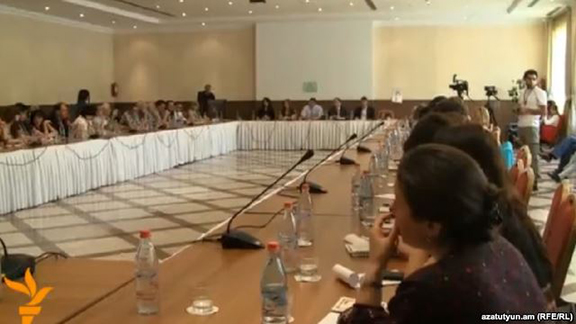Lavish ‘Donations’ To Armenian Judges Raise Questions

Lawyers meet in Yerevan after going on strike in protest against the Court of Cassation in June 2013 (Source: RFE/RL)
YEREVAN (RFE/RL)—Judges of the Court of Cassation, Armenia’s highest criminal and administrative justice body, as well as their close relatives, claim to have received at least $126,000 in financial aid last year from sources they have not disclosed.
They reported the lavish donations, seen by some civil society members as another sign of widespread corruption within the Armenian judiciary, in their annual asset declarations filed with the state Commission on the Ethics of High-Ranking Officials.
The single largest donation of $100,000 was reported by the wife of Serzhik Avetisian, a Court of Cassation judge dealing with criminal cases. Like many other Armenian state officials and their family members, the couple did not specify its source.
Ruzanna Hakobian, a member of the Court of Cassation panel on civil cases, claimed that her husband received over $17,300 in similar aid in the course of 2014. Another court judge, Hamlet Asatrian, declared a $9,000 donation.
Such donations also appear to be commonplace among judges of lower-level Armenian courts. Artur Poghosian, an Administrative Court judge, told the state anti-corruption body that his son received 7,300 euros ($8,250) in cash from an unnamed individual. Armen Bektashian, a Yerevan district court judge, also declined to explain the origin of 4,000 euros transferred to his bank account in 2014.
“I see corruption risks here,” said Gevorg Gyozalian, a lawyer who has been closely monitoring such income declarations, which are mandatory under Armenian law. “We must clarify the origin of these donations. Who gave them and why? After all, we are talking about judges and big cash transactions.”
Artak Manukian, an expert with the Armenian branch of the anti-graft watchdog Transparency International, shared these concerns. He suggested that the judges attribute the bulk of the donations to their family members in hopes of avoiding corruption allegations.
Despite having undergone frequent structural changes over the past two decades, the domestic judicial system is still regarded by many Armenians as corrupt and highly dependent on the government. Armenia’s human rights ombudsman, Karen Andreasian, highlighted the problem in a 2013 report that accused judges, the country’s highest paid state officials, of routinely taking bribes in return for corresponding rulings.
The report based on confidential interviews with lawyers, judges and prosecutors singled out the Court of Cassation. Citing anonymous interviews, it alleged that the bribes paid to the court’s judges typically range from $10,000 to $50,000 per case. Both the high court and a government body overseeing the judiciary denied the allegations.
The Court of Cassation and its chairman Arman Mkrtumian in particular have long been the main source of complaints from Armenian trial attorneys. The latter have accused Mkrtumian, among other things, of severely limiting the independence of lower courts.
Lavish “donations” coming from undisclosed sources are reported not only by judges but also many other Armenian state officials who are legally obliged to disclose their incomes to the Commission on the Ethics of High-Ranking Officials. Those include senior officials tasked with combatting corruption.
Hovannes Hovsepian, the wealthy head of President Serzh Sarkisian’s Oversight Service, is one case in point. He claims to have received a total of $2.75 million in financial aid from 2011 to 2014.
The commission in question has rarely investigated the sources and purposes of these cash flows. Since being set up in 2012, with the stated aim of detecting corrupt practices, it has not accused any Armenian official of illegal self-enrichment.
